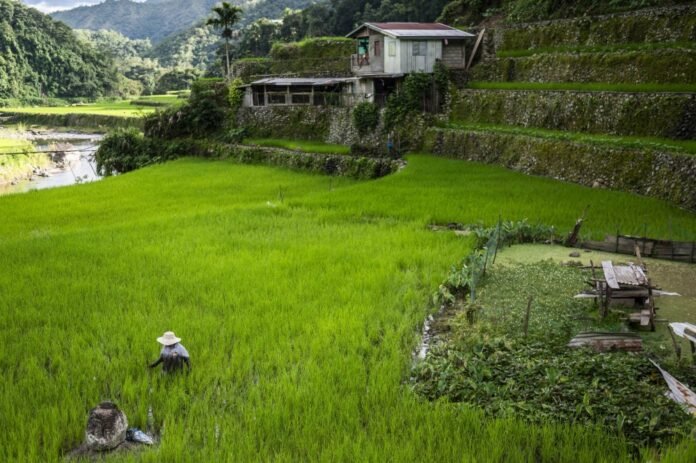Rice farming is a surprisingly large source of planet-warming methane. But while a solution to tackle emissions has existed for decades, farmers have not yet embraced it. Now a startup has found a way to get them on board with a technology that can halve harmful emissions.
Singapore-based Rize has raised $14 million in Series A funding, a round co-led by Breakthrough Energy Ventures, GenZero, Temasek and Wavemaker Impact.
Rice is responsible for about 10% of global methane emissions, due to the way it is grown. The crop is largely grown in flooded fields to avoid weeds, as other grasses are not adapted to living in flooded conditions. The water cuts off oxygen to the soil and organic matter, leading to the production of methane, a gas that has 80 times the short-term global warming potential of carbon dioxide.
Rize plans to tackle this problem by helping farmers use a simple technique called alternate wetting and drying, which involves drying out rice fields for short periods throughout the season. As the rice canopy grows, it becomes safe to dry out the field and thus reduce methane emissions. It’s a proven technique, but farmers don’t use it because they have no incentive to do so, said Ben Runkle, an associate professor in the Department of Biological and Agricultural Engineering at the University of Arkansas.
Rize gets around that hurdle by selling farm seeds, fertilizers, pesticides and other inputs at a slightly lower price than local farm stores, in exchange for implementing the practice. It can offer a lower price by buying these supplies in bulk at wholesale discounts that small farms cannot get, said managing director Dhruv Sawhney.
Farmers “take a risk to their livelihood every time they change an agricultural practice, especially if they change their irrigation practice,” said Marie Cheong, founder and partner of Wavemaker Impact. “So we had to think carefully about what would be the right incentive model for farmers who adopt this practice to be worthwhile.”
Through on-the-ground research with farmers, Rize’s investors discovered that the three things that influenced farmers’ behavior were improving yields, helping to increase sales prices, and cheaper inputs. The latter is the easiest lever to pull. Armed with this information, the investors created a plan for what Rize would become and then brought in a team to execute the vision.
Currently, the startup is working with agricultural cooperatives in Indonesia and Vietnam and plans to expand to other parts of South and Southeast Asia. It also plans to expand its revenue stream as early as this year with the sale of carbon credits that Rize will generate from the resulting reductions in methane emissions, revenue it plans to share with farmers, Sawhney said.
The company is now in its third farming season and serves approximately 2,500 hectares. Initial tests showed that methane emissions were reduced by as much as 50%. Farmers working with Rize have not noticed any decline in yields, and some have even experienced small improvements in yields and bottom lines, Sawhney said. This has contributed to the startup’s 98% farmer retention rate. Yet that is a minuscule portion of the land used for rice cultivation; Vietnam alone has about 7 million hectares of fields.
Now that its Series A funding has been secured, the company plans to increase the number of hectares using its tools by 25 times, Cheong said. Still, scaling up alternating wetting and drying is not a completely risk-free method of reducing methane emissions: predicting and quantifying how much methane emissions are avoided on a large scale “is still an open question,” Runkle said. And whether it is not done correctly. There is a risk of drought stress and diseases, which could harm farmers’ conservation and absorption. Scientists have also explored genetically engineered solutions as another way to limit methane production.
Ultimately, the company hopes to test other technologies and agricultural practices with its network of farmers to achieve its goal of eliminating 100 million tons of carbon dioxide equivalent emissions.
“Our role is to be that platform, that operating system, where all these technologies can come in,” Sawhney said. Rize is also considering piloting parametric weather insurance targeting key risks for farmers, a growing area of climate technology investment.



